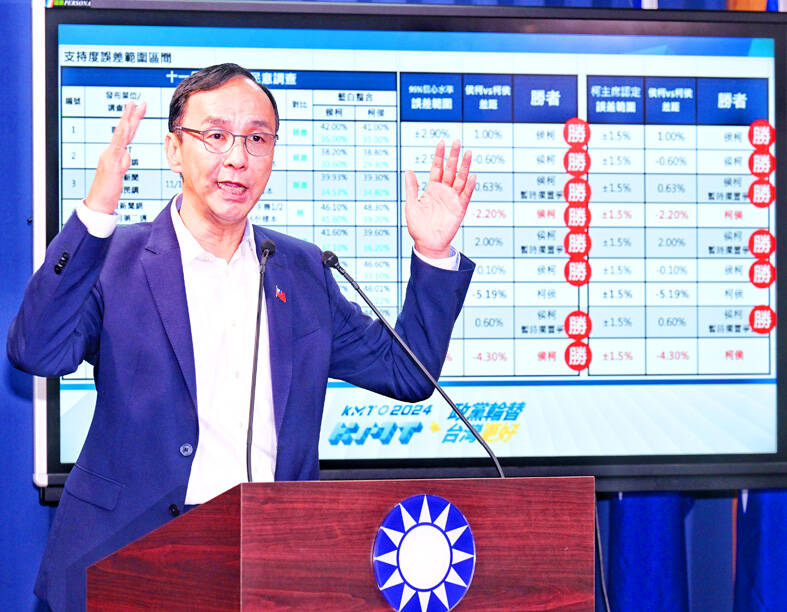Chinese Nationalist Party (KMT) Chairman Eric Chu (朱立倫) yesterday denied that the KMT has demanded that the Taiwan People’s Party (TPP) make concessions of any kind regarding the presidential candidate opinion polls.
Chu made the remark after the two parties yesterday failed to agree on who would lead the ticket in a joint presidential bid for January’s elections. Initially, the results of a poll-of-polls regarding a joint KMT-TPP presidential ticket was to be announced at 10am.
The point of contention between the parties is how many of the nine polls are considered valid and what margins of error are to be set for these polls, Chu told a press conference at 11am.

Photo: Fang Pin-chao, Taipei Times
According to Chu, if all nine polls are taken into consideration, the ratio of support for the KMT’s Hou You-yi (侯友宜) running as the presidential candidate and the TPP’s Ko Wen-je (柯文哲) as the running mate would be 8-1.
However, the TPP-nominated polling expert refused to use three of the polls, which put the valid number of polls at six, with the rate of support for a Hou-Ko pairing at 5-1, supporting a Ko-Hou pairing, Chu said.
The TPP-nominated expert also insisted on setting the margin of error at plus or minus 1.5 percentage points, which would put the ratio of support for the Hou-Ko pairing and the Hou-Ko pairing at 3-3, Chu said.
The KMT was of the opinion that all nine polls should be considered valid, Chu said, adding that a poll’s margin of error depends on its collected samples.
If a poll received 1,068 valid responses, the margin of error would be set at plus or minus 3 percentage points, Chu said as an example, adding that if a poll were to have 2,000 valid responses, then its margin of error would be plus or minus 2 percentage points, 3,000 responses at plus or minus 1.74 percentage point, and 4,250 responses at plus or minus 1.5 percentage point.
Chu said he had told Ko on Wednesday that the issue of percentage points should be set aside, and that if a poll fell within the margin of error, it would be considered a vote for the Hou-Ko pairing.
Ko himself had said that if the polls were within the margin of error, he would willingly accept running as the vice presidential candidate, Chu added.
Chu urged both sides to meet as soon as possible to settle this “minor dispute” and focus on winning the election.
Chu did not directly respond to the media’s questions about whether the TPP was playing “number games,” stating that both sides should observe the rules they had agreed to.
Both sides should keep the greater interests of the state and the public in mind, he said, adding that he has been contacting both sides since early yesterday morning, hoping to facilitate a sit-down to resolve the issue.

Chinese spouse and influencer Guan Guan’s (關關) residency permit has been revoked for repeatedly posting pro-China videos that threaten national security, the National Immigration Agency confirmed today. Guan Guan has said many controversial statements in her videos posted to Douyin (抖音), including “the red flag will soon be painted all over Taiwan” and “Taiwan is an inseparable part of China,” and expressing hope for expedited reunification. The agency last year received multiple reports alleging that Guan Guan had advocated for armed reunification. After verifying the reports, the agency last month issued a notice requiring her to appear and explain her actions. Guan

GIVE AND TAKE: Blood demand continues to rise each year, while fewer young donors are available due to the nation’s falling birthrate, a doctor said Blood donors can redeem points earned from donations to obtain limited edition Formosan black bear travel mugs, the Kaohsiung Blood Center said yesterday, as it announced a goal of stocking 20,000 units of blood prior to the Lunar New Year. The last month of the lunar year is National Blood Donation Month, when local centers seek to stockpile blood for use during the Lunar New Year holiday. The blood demand in southern Taiwan — including Tainan and Kaohsiung, as well as Chiayi, Pingtung, Penghu and Taitung counties — is about 2,000 units per day, the center said. The donation campaign aims to boost

The Kaohsiung Tourism Bureau audited six hotels in an effort to prevent price gouging ahead of Korean band BTS’ concert tour in the city scheduled for Nov. 19, 21 and 22 this year. The bureau on Friday said that the audits — conducted in response to allegations of unfair pricing posted on social media — found no wrongdoing. These establishments included the local branches of Chateau de Chine, Hotel Nikko, My Humble House, and Grand Hai Lai, it said, adding that the Consumer Protection Commission would have penalized price gougers had the accusations been substantiated. The bureau said the Tourism Development Act

BACK TO WINTER: A strong continental cold air mass would move south on Tuesday next week, bringing colder temperatures to northern and central Taiwan A tropical depression east of the Philippines could soon be upgraded to be the first tropical storm of this year, the Central Weather Administration (CWA) said yesterday, adding that the next cold air mass is forecast to arrive on Monday next week. CWA forecaster Cheng Jie-ren (鄭傑仁) said the first tropical depression of this year is over waters east of the Philippines, about 1,867km southeast of Oluanpi (鵝鑾鼻), and could strengthen into Tropical Storm Nokaen by early today. The system is moving slowly from northwest to north, and is expected to remain east of the Philippines with little chance of affecting Taiwan,